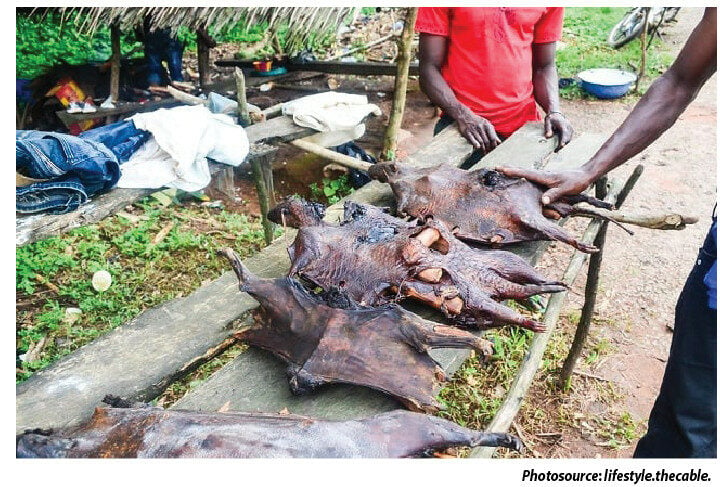In many African communities, bush meat sourced from wild animals like antelope, bats, monkeys, and grass cutters is more than just food; it’s a cultural symbol. Often featured during festive celebrations, family gatherings, and traditional ceremonies, it carries deep social significance. For some, serving bush meat reflects status or a connection to ancestral heritage.
But beyond its cultural appeal lies a growing public health concern. Experts warn that the methods used to hunt, process, and prepare these animals can expose humans to zoonotic diseases illnesses that jump from animals to people. With the world still reeling from recent outbreaks linked to wildlife, the debate over bush meat has shifted. It’s no longer just about taste or tradition, but about health, safety, and collective responsibility.
What Is Bush Meat
Bush meat refers to meat sourced from wild animals found in the forests or savannas. This may include:
Rodents (e.g., grass cutters)
Primates (e.g., monkeys)
Reptiles (e.g., snakes)
Ungulates (e.g., antelopes, wild pigs)
Bats and other flying mammals
These animals are often caught using traps, snares, or bushfires, and the processing is done without proper veterinary supervision or hygiene protocols.
Health Risks Linked To Bush Meat Consumption
Zoonotic Diseases
The major health concern with bush meat is its potential to carry zoonotic pathogens — diseases that pass from animals to humans.
Well-known outbreaks linked to bush meat include:
Ebola: Transmitted through contact with infected animals such as fruit bats and primates.
HIV/AIDS: Scientists trace the origin to simian viruses passed on to humans during the butchering of chimpanzees.
Lassa fever and Monkeypox are also linked to exposure to rodents and other wild animals.
Bacterial Contamination
Wild animals may carry bacteria like Salmonella and E. coli. Without proper handling and cooking, these can lead to food poisoning and gastrointestinal infections.
Toxins and Heavy Metals
Because these animals are not farm-raised, their food sources may be polluted. They may carry heavy metals, pesticides, or environmental toxins, which accumulate in human organs over time.
Drug-Resistant Pathogens
Unregulated bush meat can expose humans to microbes that have never been tested or understood. In some rare cases, they may carry pathogens resistant to antibiotics or cause unknown infections.
What Can Be Done
Promote safer meat alternatives such as farm-raised animals or plant-based protein
Improve surveillance and testing in markets and abattoirs
Educate communities about the risks of hunting and preparing wild animals
Strengthen laws protecting endangered species and regulating bushmeat trade
Encourage proper hygiene and thorough cooking when meat is consumed





